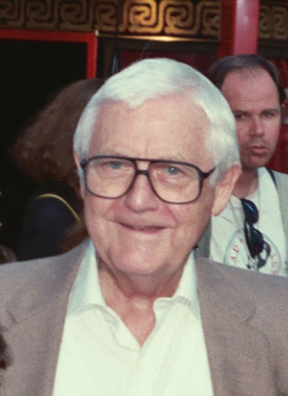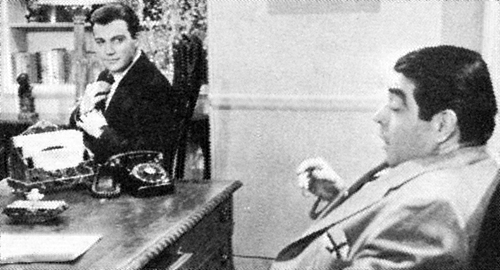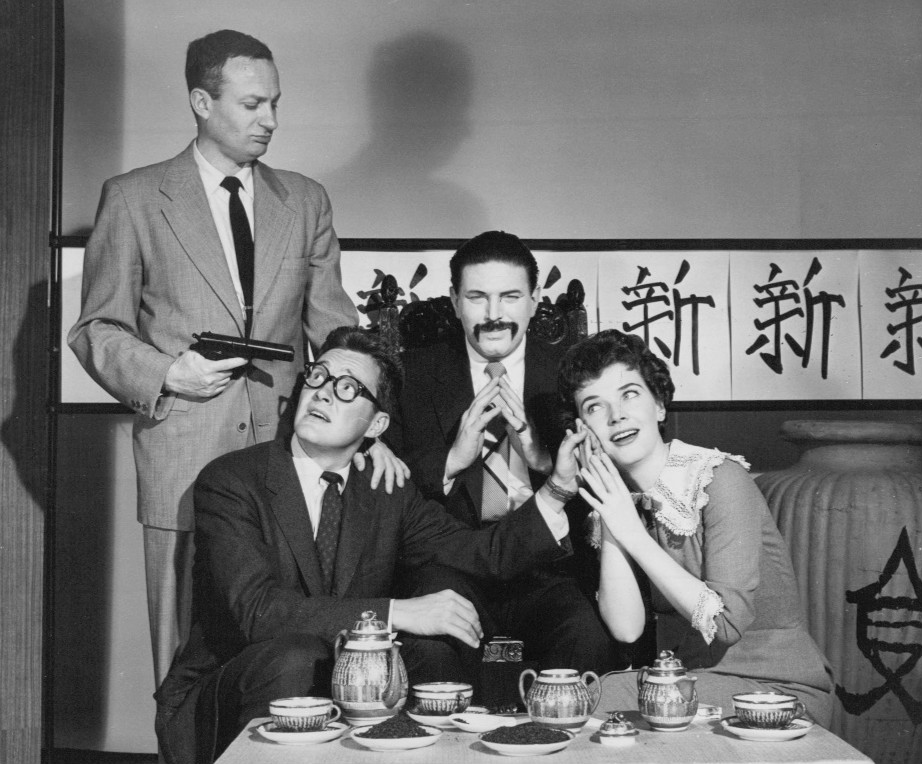|
No Way To Stop It
"No Way to Stop It" is a show tune from the 1959 Rodgers and Hammerstein musical ''The Sound of Music'', but not included in the later film version from 1965. The song features the characters Max Detweiler and Baroness Elsa Schräder, with Captain Georg von Trapp joining in later. It was first performed by Marion Marlowe, Kurt Kasznar and Theodore Bikel Theodore Meir Bikel ( ; May 2, 1924 – July 21, 2015) was an Austrian-American actor, folk singer, musician, composer, unionist, and political activist. He appeared in films, including '' The African Queen'' (1951), ''Moulin Rouge'' (1952), ' .... Summary Captain von Trapp anticipates the German annexation of Austria, and argues with Elsa and Max about how to respond to the Nazis, who have begun to overrun the country. While the Captain holds Austrian nationalist views and believes he must stand up to the Nazis, Elsa and Max say there is nothing anyone can do, and that the Captain should be flexible and make the Nazis thin ... [...More Info...] [...Related Items...] OR: [Wikipedia] [Google] [Baidu] |
Oscar Hammerstein II
Oscar Greeley Clendenning Hammerstein II (; July 12, 1895 – August 23, 1960) was an American lyricist, librettist, theatrical producer, and (usually uncredited) director in the musical theater for almost 40 years. He won eight Tony Awards and two Academy Awards for Best Original Song. Many of his songs are standard repertoire for vocalists and jazz musicians. He co-wrote 850 songs. He is best known for his collaborations with composer Richard Rodgers, as the duo Rodgers and Hammerstein, whose musicals include ''Oklahoma!'', '' Carousel'', '' South Pacific'', ''The King and I'', and ''The Sound of Music''. Described by Stephen Sondheim as an "experimental playwright", Hammerstein helped bring the American musical to new maturity by popularizing musicals that focused on stories and character rather than the lighthearted entertainment that the musical had been known for beforehand. He also collaborated with Jerome Kern (with whom he wrote ''Show Boat''), Vincent Y ... [...More Info...] [...Related Items...] OR: [Wikipedia] [Google] [Baidu] |
Richard Rodgers
Richard Charles Rodgers (June 28, 1902 – December 30, 1979) was an American Musical composition, composer who worked primarily in musical theater. With 43 Broadway musicals and over 900 songs to his credit, Rodgers was one of the most well-known American composers of the 20th century, and his compositions had a significant influence on popular music. Rodgers is known for his songwriting partnerships, first with lyricist Lorenz Hart and then with Oscar Hammerstein II. With Hart he wrote musicals throughout the 1920s and 1930s, including ''Pal Joey (musical), Pal Joey'', ''A Connecticut Yankee (musical), A Connecticut Yankee'', ''On Your Toes'' and ''Babes in Arms.'' With Hammerstein he wrote musicals through the 1940s and 1950s, such as ''Oklahoma!'', ''Flower Drum Song'', ''Carousel (musical), Carousel'', ''South Pacific (musical), South Pacific'', ''The King and I'', and ''The Sound of Music''. His collaborations with Hammerstein, in particular, are celebrated for brin ... [...More Info...] [...Related Items...] OR: [Wikipedia] [Google] [Baidu] |
Show Tune
A show tune is a song originally written as part of the score of a work of musical theatre or musical film, especially if the piece in question has become a standard, more or less detached in most people's minds from the original context. Though show tunes vary in style, they do tend to share common characteristics—they usually fit the context of a story being told in the original musical, they are useful in enhancing and heightening choice moments. A particularly common form of show tune is the "I Want" song, which composer Stephen Schwartz noted as being particularly likely to have a lifespan outside the show that spawned it. Show tunes were a major venue for popular music before the rock and roll and television era; most of the hits of such songwriters as Jerome Kern, Cole Porter, and George Gershwin came from their shows. (Even into the television and rock era, a few stage musicals managed to turn their show tunes into major pop music hits, sometimes aided by fi ... [...More Info...] [...Related Items...] OR: [Wikipedia] [Google] [Baidu] |
Rodgers And Hammerstein
Rodgers and Hammerstein was a theater-writing team of composer Richard Rodgers (1902–1979) and lyricist-dramatist Oscar Hammerstein II (1895–1960), who together created a series of innovative and influential American musicals. Their popular Broadway productions in the 1940s and 1950s initiated what is considered the "golden age" of musical theater. Gordon, John Steele''Oklahoma'!'. Retrieved June 13, 2010 Five of their Broadway shows, ''Oklahoma!'', '' Carousel'', '' South Pacific'', ''The King and I'' and ''The Sound of Music'', were outstanding successes, as was the television broadcast of ''Cinderella'' (1957). Of the other four shows that the team produced on Broadway during their lifetimes, ''Flower Drum Song'' was well-received, and none was an outright flop. Most of their shows have received frequent revivals around the world, both professional and amateur. Among the many accolades their shows (and film versions) garnered were thirty-four Tony Awards, fifteen Academ ... [...More Info...] [...Related Items...] OR: [Wikipedia] [Google] [Baidu] |
Musical Theatre
Musical theatre is a form of theatrical performance that combines songs, spoken dialogue, acting and dance. The story and emotional content of a musical – humor, pathos, love, anger – are communicated through words, music, movement and technical aspects of the entertainment as an integrated whole. Although musical theatre overlaps with other theatrical forms like opera and dance, it may be distinguished by the equal importance given to the music as compared with the dialogue, movement and other elements. Since the early 20th century, musical theatre stage works have generally been called, simply, musicals. Although music has been a part of dramatic presentations since ancient times, modern Western musical theatre emerged during the 19th century, with many structural elements established by the works of Gilbert and Sullivan in Britain and those of Harrigan and Hart in America. These were followed by the numerous Edwardian musical comedies and the musical theatre w ... [...More Info...] [...Related Items...] OR: [Wikipedia] [Google] [Baidu] |
The Sound Of Music
''The Sound of Music'' is a musical with music by Richard Rodgers, lyrics by Oscar Hammerstein II, and a book by Howard Lindsay and Russel Crouse. It is based on the 1949 memoir of Maria von Trapp, '' The Story of the Trapp Family Singers''. Set in Austria on the eve of the ''Anschluss'' in 1938, the musical tells the story of Maria, who takes a job as governess to a large family while she decides whether to become a nun. She falls in love with the children, and eventually their widowed father, Captain von Trapp. He is ordered to accept a commission in the German navy, but he opposes the Nazis. He and Maria decide on a plan to flee Austria with the children. Many songs from the musical have become standards, including "Edelweiss", " My Favorite Things", "Climb Ev'ry Mountain", "Do-Re-Mi", and the title song "The Sound of Music". The original Broadway production, starring Mary Martin and Theodore Bikel, opened in 1959 and won five Tony Awards, including Best Musical, out of nine ... [...More Info...] [...Related Items...] OR: [Wikipedia] [Google] [Baidu] |
The Sound Of Music (film)
''The Sound of Music'' is a 1965 American musical drama film produced and directed by Robert Wise, and starring Julie Andrews and Christopher Plummer, with Richard Haydn, Peggy Wood, Charmian Carr, and Eleanor Parker. The film is an adaptation of the 1959 stage musical of the same name, composed by Richard Rodgers with lyrics by Oscar Hammerstein II. The film's screenplay was written by Ernest Lehman, adapted from the stage musical's book by Lindsay and Crouse. Based on the 1949 memoir '' The Story of the Trapp Family Singers'' by Maria von Trapp, the film is about a young Austrian postulant in Salzburg, Austria, in 1938 who is sent to the villa of a retired naval officer and widower to be governess to his seven children. After bringing love and music into the lives of the family, she marries the officer and, together with the children, finds a way to survive the loss of their homeland to the Nazis. Filming took place from March to September 1964 in Los Angeles and Salzburg. ' ... [...More Info...] [...Related Items...] OR: [Wikipedia] [Google] [Baidu] |
Marion Marlowe
Marion Marlowe (born Marion Townsend; March 7, 1929 – March 24, 2012) - accessed March 27, 2012 was an American singer and actress. She is best known for her recordings of "" and "Heartbeat". Marlowe worked with Frank Parker (" Moonlight and Roses") and was married to the television producer Larry Puck. Early years Marlowe was born in , and her father died se ...[...More Info...] [...Related Items...] OR: [Wikipedia] [Google] [Baidu] |
Kurt Kasznar
Kurt Kasznar (born Kurt Servischer; August 13, 1913 – August 6, 1979) was an Austrian-American stage, film and television actor who played roles on Broadway, appearing in the original Broadway productions of '' Waiting for Godot'', ''The Sound of Music'' and ''Barefoot in the Park''. He also appeared in feature films and had many notable parts in television, including the science fiction series ''Land of the Giants''. "A big, glib, dapper man who spoke with an accent, he was almost always cast as some sort of a Continental gentleman," reported ''The New York Times''. As a soldier in World War II, Kasznar was among the first U.S. Army photographers to film the ruins of Hiroshima and Nagasaki. Early life Kurt Kasznar was born Kurt Servischer on August 13, 1913, in Vienna, Austria-Hungary. His family was Jewish. His father left the family when Kurt was very young. After his mother married Hungarian restaurateur Ferdinand Kasznar, Kurt assumed his surname. While working ... [...More Info...] [...Related Items...] OR: [Wikipedia] [Google] [Baidu] |
Theodore Bikel
Theodore Meir Bikel ( ; May 2, 1924 – July 21, 2015) was an Austrian-American actor, folk singer, musician, composer, unionist, and political activist. He appeared in films, including '' The African Queen'' (1951), ''Moulin Rouge'' (1952), ''The Kidnappers'' (1953), ''The Enemy Below'' (1957), ''I Want to Live!'' (1958), ''My Fair Lady'' (1964), ''The Russians Are Coming, the Russians Are Coming'' (1966), and '' 200 Motels'' (1971). For his portrayal of Sheriff Max Muller in ''The Defiant Ones'' (1958), he was nominated for the Academy Award for Best Supporting Actor. He made his stage debut in ''Tevye the Milkman'' in Tel Aviv, Israel, when he was in his teens. He later studied acting at Britain's Royal Academy of Dramatic Art, and made his London stage debut in 1948 and in New York in 1955. He was also a widely recognized and recorded folk singer and guitarist. In 1959, he co-founded the Newport Folk Festival, and created the role of Captain von Trapp opposite Mary Martin a ... [...More Info...] [...Related Items...] OR: [Wikipedia] [Google] [Baidu] |
Anschluss
The (, or , ), also known as the (, en, Annexation of Austria), was the annexation of the Federal State of Austria into the German Reich on 13 March 1938. The idea of an (a united Austria and Germany that would form a " Greater Germany") began after the unification of Germany excluded Austria and the German Austrians from the Prussian-dominated German Empire in 1871. Following the end of World War I with the fall of the Austro-Hungarian Empire, in 1918, the newly formed Republic of German-Austria attempted to form a union with Germany, but the Treaty of Saint Germain (10 September 1919) and the Treaty of Versailles (28 June 1919) forbade both the union and the continued use of the name "German-Austria" (); and stripped Austria of some of its territories, such as the Sudetenland. Prior to the , there had been strong support in both Austria and Germany for unification of the two countries. In the immediate aftermath of the dissolution of the Habsburg monarchy—with ... [...More Info...] [...Related Items...] OR: [Wikipedia] [Google] [Baidu] |
1959 Songs
Events January * January 1 - Cuba: Fulgencio Batista flees Havana when the forces of Fidel Castro advance. * January 2 - Lunar probe Luna 1 was the first man-made object to attain escape velocity from Earth. It reached the vicinity of Earth's Moon, and was also the first spacecraft to be placed in heliocentric orbit. * January 3 ** The three southernmost atolls of the Maldive Islands, Maldive archipelago (Addu Atoll, Huvadhu Atoll and Fuvahmulah island) United Suvadive Republic, declare independence. ** Alaska is admitted as the 49th U.S. state. * January 4 ** In Cuba, rebel troops led by Che Guevara and Camilo Cienfuegos enter the city of Havana. ** Léopoldville riots: At least 49 people are killed during clashes between the police and participants of a meeting of the ABAKO Party in Kinshasa, Léopoldville in the Belgian Congo. * January 6 ** Fidel Castro arrives in Havana. ** The International Maritime Organization is inaugurated. * January 7 – The United States reco ... [...More Info...] [...Related Items...] OR: [Wikipedia] [Google] [Baidu] |







